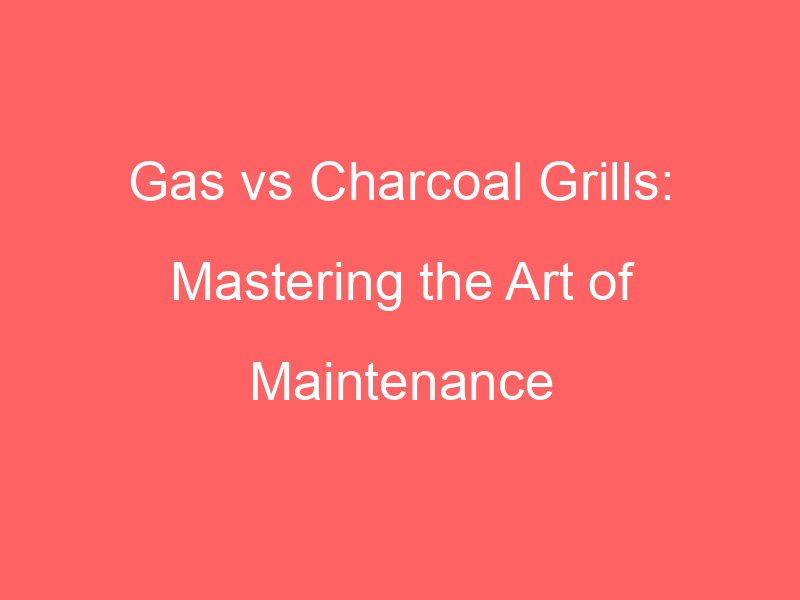Introduction to Grill Maintenance
Hey there, grill masters! Let’s talk about something super important – grill maintenance. Just like your car or your bike, your grill needs some love and care too. Keeping it clean and well-maintained not only makes your food taste better, but it also helps your grill last longer. So, let’s dive in and learn all about it!
- Importance of Regular Grill Maintenance
- Grill Maintenance Tips for Longevity
- Clean it regularly: After each use, give your grill a good scrub with a grill brush to remove any leftover food particles and grease.
- Check for leaks: If you’re using a gas grill, make sure to check for gas leaks regularly. A simple way to do this is by applying a soap-water solution to the gas line and looking for bubbles.
- Protect it from the elements: When not in use, cover your grill or store it in a dry, protected area to prevent rusting and weather damage.
First things first, why should you bother with grill maintenance? Well, there are a few reasons. Regular maintenance helps your grill heat up properly and cook your food evenly. It also prevents nasty flare-ups caused by grease build-up. Plus, it extends the life of your grill. According to a Wikipedia article, a well-maintained grill can last up to 20 years! Now, that’s a lot of delicious barbecues!
Want to keep your grill in tip-top shape for years to come? Here are some handy tips:
Remember, a little care goes a long way in keeping your grill happy and your barbecues tasty!
Gas vs Charcoal Grills: An Overview
Hey there, grill enthusiasts! Today, we’re going to dive into the world of grills and explore the differences between gas and charcoal grills. We’ll also look at the pros and cons of each, so you can make the best choice for your backyard barbecues. Let’s get grilling!
- Differences between gas and charcoal grills
- Pros and cons of gas grills
- Pros and cons of charcoal grills
Gas and charcoal grills may both be great for cooking up some juicy burgers, but they’re quite different in how they work. Gas grills use propane or natural gas, and they heat up quickly. You can easily control the temperature, which makes them great for a variety of foods.
On the other hand, charcoal grills use charcoal briquettes for heat. They take a bit longer to heat up, but many people swear by the unique, smoky flavor they give to the food.
Gas grills are super convenient. They heat up fast, offer easy temperature control, and clean up is a breeze. However, they’re usually more expensive than charcoal grills. And while they’re great for cooking, they don’t give that smoky flavor that charcoal grills do.
Charcoal grills are often more affordable and portable than gas grills. They’re also the go-to choice for that classic, smoky barbecue flavor. But, they do take longer to heat up, and controlling the temperature can be tricky. Plus, cleaning up after a charcoal grill can be a bit of a chore.
So, there you have it! Whether you’re a fan of the quick and easy gas grill, or you’re all about that charcoal flavor, there’s a grill out there for everyone. Happy grilling!
Gas Grill Maintenance
Keeping your gas grill in tip-top shape is easier than you think. All it takes is a little bit of time and some elbow grease. Here are the three main steps to maintaining a gas grill:
How to Maintain a Gas Grill
- Regular cleaning of gas grills
- Checking for gas leaks
- Replacing worn out parts
Cleaning your gas grill regularly is the first step to maintaining it. After each use, make sure to clean the grates to remove any leftover food particles. You can use a grill brush for this. Also, don’t forget to clean the burners and the inside of the grill. This will prevent build-up that can affect the performance of your grill.
Gas leaks can be dangerous and can also affect the performance of your grill. To check for leaks, make a solution of water and dish soap and apply it to the gas line and connections. If you see bubbles forming, that means there’s a leak. Make sure to fix any leaks before using your grill.
Over time, parts of your grill may wear out and need to be replaced. This includes the burners, igniters, and heat shields. Regularly inspect your grill and replace any worn-out parts to keep it working efficiently.
By following these steps, you can keep your gas grill working like new for many years. Happy grilling!
Gas Grill Cleaning Techniques
Keeping your gas grill clean is super important. Not only does it make your food taste better, but it also extends the life of your grill. Here are some easy and effective ways to clean your gas grill.
- Using a Grill Brush
- Using a Grill Stone
- Deep Cleaning Techniques
A grill brush is a handy tool for cleaning your gas grill. It’s perfect for scrubbing off those stubborn bits of food and grease that stick to the grill grates. Just heat up your grill, scrub with the brush, and voila! Your grill grates are clean and ready for your next BBQ. Don’t have a grill brush? No worries! You can also use a ball of aluminum foil held with tongs. It works just as well!
A grill stone is another great tool for cleaning your gas grill. It’s a block of pumice stone that you can use to scrape off the gunk on your grill grates. Just rub the stone back and forth over the grates, and it’ll do the job. Plus, it’s a natural and chemical-free way to clean your grill. Pretty cool, right?
Every once in a while, your gas grill needs a deep clean. This means taking it apart and cleaning each piece individually. Start by removing the grates and burners. Soak them in a mixture of warm water and dish soap. While they’re soaking, clean the inside of the grill with a grill brush and soapy water. Don’t forget to clean the drip tray too! Once everything is clean, rinse and dry all the parts before putting the grill back together. It might take a bit of time, but trust us, it’s worth it!
Remember, a clean grill is a happy grill. So, don’t forget to clean your gas grill regularly. Happy grilling!
Charcoal Grill Maintenance
Keeping your charcoal grill in top shape is easier than you might think. With a little bit of time and effort, you can ensure your grill is always ready for your next barbecue. Here are some simple steps to maintain your charcoal grill.
How to Maintain a Charcoal Grill
- Regular cleaning of charcoal grills
- Replacing worn out parts
- Proper storage of charcoal grills
Regular cleaning is the first step in maintaining your charcoal grill. After each use, remove the ashes and scrub the grates with a grill brush. This prevents build-up that can affect the taste of your food and the performance of your grill. Remember, a clean grill is a happy grill!
Over time, parts of your grill may wear out or become damaged. Regularly check your grill for any signs of wear and tear. If you notice any, replace them immediately. This not only keeps your grill working properly but also extends its lifespan.
When not in use, store your grill in a dry, covered area to protect it from the elements. If you live in a particularly rainy or snowy area, consider investing in a grill cover for extra protection. Also, remember to store your charcoal in a dry place to keep it from getting damp.
With these simple steps, you can keep your charcoal grill in top shape and ready for your next barbecue. Happy grilling!
Charcoal Grill Cleaning Techniques
Keeping your charcoal grill clean is not just about making it look good. It’s about safety, efficiency, and the taste of your food. Here are some simple techniques you can use:
- Using a Grill Brush
- Using a Grill Stone
- Deep Cleaning Techniques
A grill brush is your best friend when it comes to cleaning a charcoal grill. It’s designed to scrape off the stubborn food particles and grease that stick to the grill grates. After each grilling session, let your grill cool down a bit, but while it’s still warm, give it a good scrub with the grill brush. This will make your next grilling experience much more enjoyable. Learn more about grill brushes here.
A grill stone is another handy tool for cleaning your charcoal grill. It’s a block of pumice or other abrasive material that you can use to scrub away at the grime on your grill grates. It’s especially useful for tackling those hard-to-reach areas that a brush might miss. Just remember to rinse the grill grates thoroughly after using a grill stone to remove any residue. Learn more about grill stones here.
Every once in a while, your charcoal grill will need a deep clean. This involves removing the grates and cleaning them separately, cleaning the inside of the grill, and emptying and cleaning the ash catcher. You can use a mixture of warm water and dish soap for this task. Be sure to rinse everything thoroughly and let it dry before reassembling your grill. Learn more about deep cleaning techniques here.
Remember, a clean grill is a happy grill. And a happy grill makes for delicious food!
Comparative Analysis: Gas vs Charcoal Grill Maintenance
When it comes to grilling, the debate between gas and charcoal grills is a heated one. But have you ever wondered which one is easier to maintain? Let’s dive into a comparative analysis of gas vs charcoal grill maintenance. We’ll compare cleaning techniques, maintenance costs, and longevity.
- Comparing cleaning techniques
- Comparing maintenance costs
- Comparing longevity
Gas grills are generally easier to clean. They often come with a grease management system that collects drippings, making it easier to dispose of the mess. Just remove the drip tray, empty it, and you’re good to go. On the other hand, cleaning a charcoal grill can be a bit messy. You have to remove the ashes and scrub the grates after each use. However, some people find this process therapeutic and part of the grilling experience.
Gas grills tend to be more expensive upfront, but they can be cheaper to maintain in the long run. The cost of propane or natural gas is usually less than charcoal. Plus, gas grills often come with warranties that cover parts and repairs. Charcoal grills are cheaper initially, but the cost of charcoal can add up over time. And since they’re often made of less durable materials, they might need to be replaced more often.
When it comes to longevity, gas grills usually win. They’re often made of stainless steel, which is resistant to rust and weather damage. If well-maintained, a gas grill can last for many years. Charcoal grills, on the other hand, tend to wear out faster. The constant heat and ash can cause the metal to corrode over time. But with proper care and maintenance, a charcoal grill can also last for a good number of years.
In conclusion, both gas and charcoal grills have their pros and cons when it comes to maintenance. It all comes down to your personal preference and how much time and effort you’re willing to put into maintaining your grill. Happy grilling!
Case Studies
Let’s dive into some real-life examples to better understand the importance of grill maintenance. We’ve got two interesting case studies to share with you.
- Case study 1: The impact of regular maintenance on grill lifespan
- Case study 2: Comparative study on maintenance costs of gas and charcoal grills
Meet John, a grill enthusiast who loves hosting backyard barbecues. John bought a high-quality gas grill five years ago. He made sure to clean it after every use, checked the burners and hoses regularly, and always covered it when not in use. Guess what? His grill is still in excellent condition and works as well as it did on day one! On the other hand, his neighbor, Mike, who bought the same grill but didn’t maintain it well, had to replace his grill after just three years. This case study clearly shows that regular maintenance can significantly extend the lifespan of your grill.
Let’s look at Sarah and Lisa, both avid grillers. Sarah owns a gas grill, while Lisa prefers a charcoal one. Over a year, Sarah spent around $50 on maintenance, including cleaning supplies and replacement parts. Lisa, however, spent nearly $100! Charcoal grills tend to require more cleaning and part replacements due to the ash and residue left from the charcoal. This case study demonstrates that gas grills can be more cost-effective to maintain than charcoal grills.
These case studies highlight the importance of regular maintenance in extending your grill’s lifespan and saving money in the long run. So, remember to take good care of your grill, and it will take care of your delicious meals!
Conclusion: Mastering the Art of Grill Maintenance
Well, folks, we’ve come a long way in our grill maintenance journey. Whether you’re a gas grill enthusiast or a charcoal grill fan, we’ve got you covered. Let’s wrap things up with some key takeaways and final thoughts on gas vs charcoal grill maintenance.
- Key takeaways
- Regular cleaning is a must for both gas and charcoal grills. This helps prevent build-up that can affect the taste of your food and the performance of your grill.
- Gas grills require checking for gas leaks, while charcoal grills need proper ash disposal.
- Always cover your grill when not in use to protect it from the elements.
- Remember, safety first! Always follow the manufacturer’s instructions for maintenance and use.
- Final thoughts on gas vs charcoal grill maintenance
Grill maintenance isn’t just about keeping your grill looking spiffy. It’s about ensuring the longevity of your grill and the quality of your grilling. Here are some important points to remember:
When it comes to gas vs charcoal grill maintenance, it’s not about which one is better. It’s about understanding the unique needs of your grill and catering to them. Gas grills require more technical maintenance, while charcoal grills require more cleaning. But at the end of the day, a well-maintained grill is a happy grill, no matter what type it is.
So there you have it, folks! With these tips and tricks, you’re well on your way to becoming a grill maintenance master. Happy grilling!






